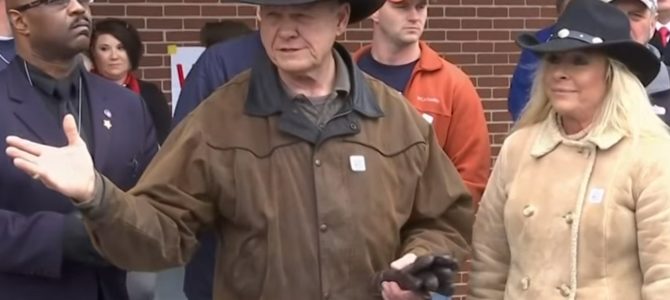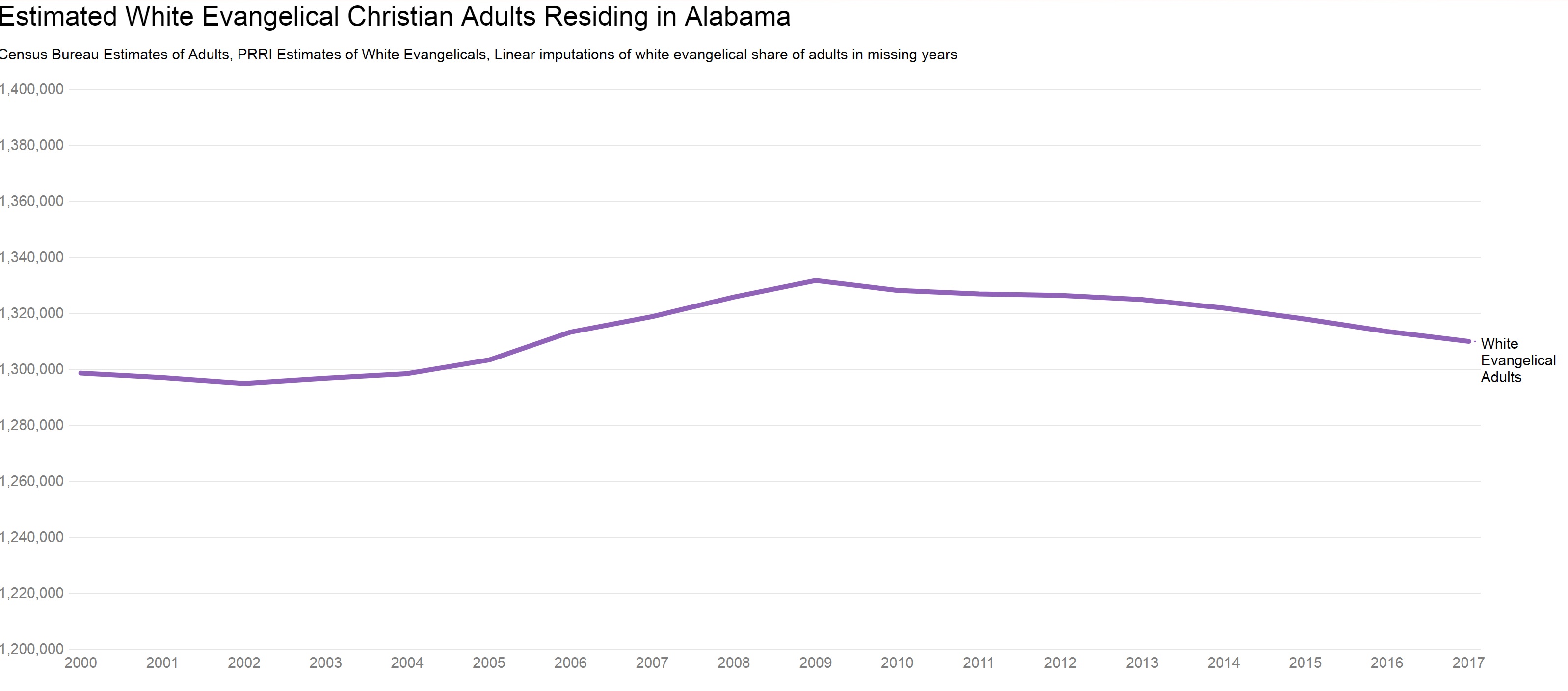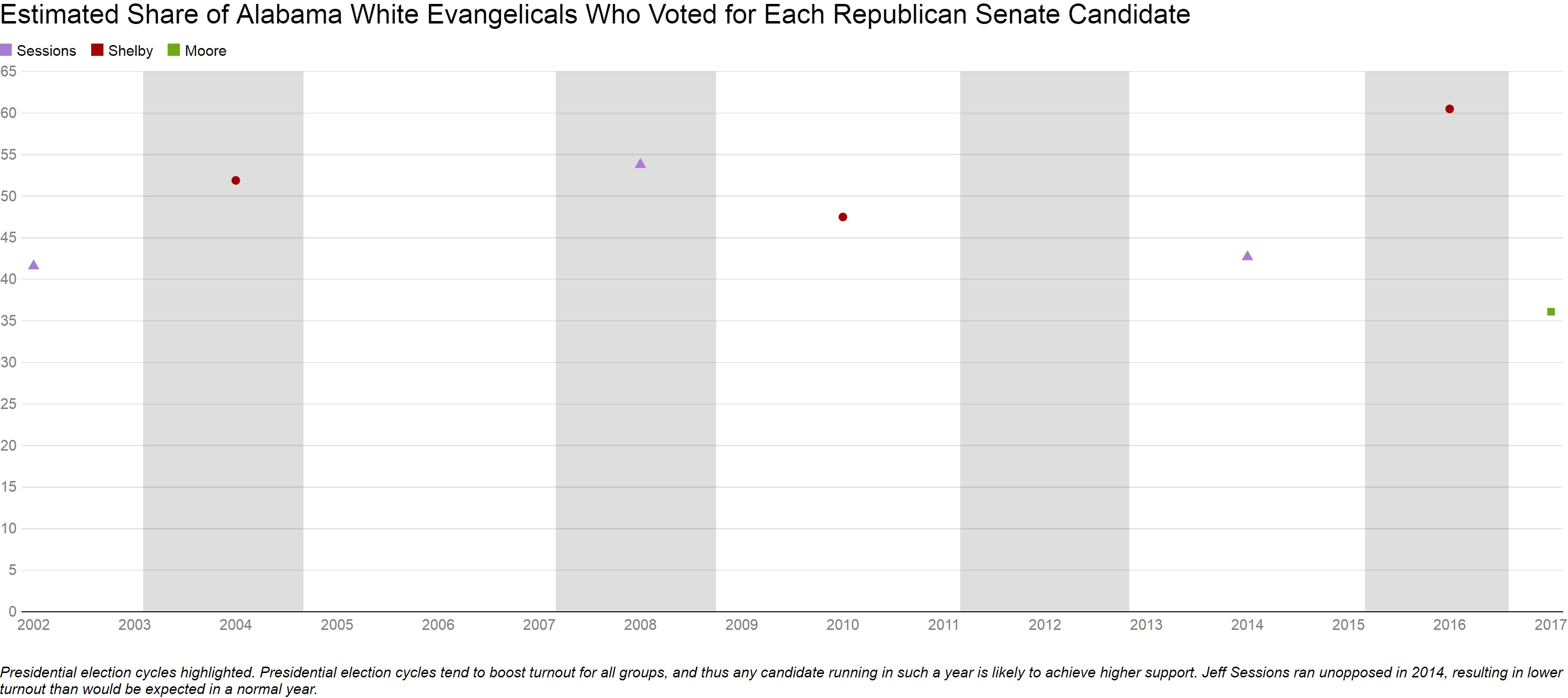
Exit polls from the Alabama Senate special election on Tuesday show that Roy Moore got 80 percent of the white evangelical vote, but nonetheless went down to defeat. This is shocking, because white evangelicals are a big share of Alabama’s population. Indeed, public polling on religion suggests Alabama should be the third-strongest-state for white evangelicals! Only Tennessee, West Virginia, and Arkansas have more of us than Alabama has. So if it’s a big voting bloc and they’re 80 percent for a candidate, shouldn’t that candidate win?
This is where opinion polling gets tricky. The exit poll from Alabama shows that white evangelicals made up about 44 percent of the electorate, versus somewhere between 35 percent and 47 percent of the general population, depending on which polls and methods you use. White evangelicals were probably slightly over-represented in the electorate versus their population share, indicating they had higher turnout than other groups did.
With high turnout and 80 percent in favor of a candidate in a group that is a large population share, victory should be assured. But it was not to be.
In reality, Roy Moore substantially underperformed among white evangelicals. Understandably turned off by his apparent opposition to religious liberty, disregard for the Constitution, weirdly positive comments about slavery, and his alleged sexual misconduct, white evangelicals gave Moore the worst showing of any Alabama Republican Senate candidate in the twenty-first century.
So Let’s Crunch Some Numbers
Proving this mathematically is simple in theory, but complicated in practice, so very few pundits have even tried. First, we need to know how many white evangelical adults were in Alabama during each previous senatorial election. Then we need to know how many white evangelicals actually voted for the Republican candidate in each election.
To get the first number, I use Census Bureau estimates of the adult population, and take estimates of the white evangelical population from the Public Religion Research Institute. I also tested using estimates from the Pew Religious Landscape Surveys, and all the results came back with the same trends showing. For this post, I’ll only display the PRRI results for simplicity. Between survey-years, I make linear imputations. Here’s my estimate of Alabama’s white evangelical adult population:

To figure out how many white evangelicals voted for the Republican candidate, we can use exit polls and total vote tallies. If we know what share of the electorate was white evangelicals from exit polls, and what share of those polled voted for the GOP candidate, we can figure out by simple multiplication what share of the electorate was a white evangelical who voted for the GOP candidate.
We can then multiply that share by the total number of votes cast, and that tells us roughly how many white evangelicals voted for the Republican. Dividing those votes cast by the total potential evangelical electorate, as calculated from Census and PRRI, and we can estimate the degree of political support that each Republican actually got in each election. The chart below shows the results.

Moore didn’t even achieve Jeff Sessions’s share of white evangelicals from 2014, when Sessions was literally the only person even on the ballot, resulting in a very low-interest election cycle. Comparing to the last off-cycle election that actually had a Democratic candidate and a reason for voters to show up, in 2010, Moore massively underperformed: his share of the white evangelical vote was about 10 percentage points lower than that of the other Alabama U.S. senator, Richard Shelby.
Shelby’s performance among white evangelicals is quite impressive in all three cycles where he ran: his off-cycle election performance among white evangelicals is much better than Sessions’s was, and his presidential-year performance is as good or better as well. Tellingly, as the most convincing comparator for white evangelicals’ behavior in Alabama Senate races, Shelby publicly refused to endorse Moore, and said he voted for a write-in candidate. He was not alone in that.
Moore’s Democratic opponent Doug Jones won by 21,000 votes, about the number of write-in votes received. Put another way, that would have been about 1.6 percent of white evangelicals. In other words, had white evangelicals not abandoned Moore in large, electorally significant numbers compared to previous Alabama GOP senators, Moore would have won, and won handily.
Had Moore enjoyed the level of support of just the average off-cycle Alabama Republican, he would have gotten about 105,000 more votes, and won the election. If he had enjoyed passionate support from evangelicals, as the media tried to say he had, and matched the best off-cycle performance, he’d have gotten about 150,000 more votes. Heck, if he’d simply tied the worst-ever performance, he’d still have won, getting about 70,000 more votes. But instead, Moore’s election set a new low for the GOP’s share of the white evangelical electorate.
We’re Gonna Sit This One Out
Many commentators are going to position Moore’s defeat as some kind of big let-down for evangelicals. It isn’t. More than 60 percent of the white evangelical adults in Alabama did not cast a vote for Moore.
True, very few voted for Jones, perhaps because Jones supports abortion, which must of us adult white evangelicals consider to be murder. But white evangelical turnout fell from nearly 75 percent in the 2016 race (which, of course, had a presidential election as well), to about 45 percent in 2016. That’s not some marginal change by a few evangelicals of conscience; that’s a powerful expression by a large share of Alabama’s electorate that political nonparticipation was better to them than the options they were offered.
Pundits like exit polls because it makes them feel like they can characterize large numbers of Americans by politicians’ statements and behaviors. But most Americans’ lives and beliefs aren’t defined by their political leaders. The truth is that, for white evangelicals, it was a very vocal minority that came out and voted for Moore. Without making reasonable adjustments for political participation, exit polls can overstate the degree of ideological uniformity within a group. And statistically speaking, Alabama’s white evangelicals just weren’t that keen on Moore.
Nationally, white evangelicals are turning on the entire Trumpist project. Recent opinion polling shows that white evangelical Protestants have had the sharpest decline in approval of President Trump since February, from 78 percent approval to 61 percent. That’s still higher than any other religious group, but it’s a bigger decline even than observed among “moderate/liberal Republicans,” Hispanics, women, or any other group. The truth is, America’s white evangelicals were late-comers to the Trump-train, preferring almost any other candidate to him—and we’re probably going to be the first big Republican constituency to flip on him.









